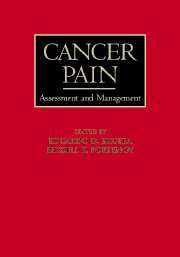Book contents
- Frontmatter
- Contents
- List of contributors
- Preface
- SECTION I MECHANISMS AND EPIDEMIOLOGY
- SECTION II ASSESSMENT AND SYNDROMES
- SECTION III PHARMACOLOGICAL TREATMENT
- SECTION IV NONPHARMACOLOGICAL APPROACHES
- SECTION V THE ROLE OF ANTINEOPLASTIC THERAPIES IN PAIN CONTROL
- SECTION VI PAIN IN SPECIAL POPULATIONS
- SECTION VII DIFFICULT PAIN PROBLEMS
- SECTION VIII SPECIAL TOPICS
- 25 Pain in medical illness: ethical foundations
- 26 Understanding clinical trials in pain research
- 27 Legal and regulatory aspects of opioid treatment: the United States experience
- 28 Role of family caregivers in cancer pain management
- Index
25 - Pain in medical illness: ethical foundations
from SECTION VIII - SPECIAL TOPICS
Published online by Cambridge University Press: 08 October 2009
- Frontmatter
- Contents
- List of contributors
- Preface
- SECTION I MECHANISMS AND EPIDEMIOLOGY
- SECTION II ASSESSMENT AND SYNDROMES
- SECTION III PHARMACOLOGICAL TREATMENT
- SECTION IV NONPHARMACOLOGICAL APPROACHES
- SECTION V THE ROLE OF ANTINEOPLASTIC THERAPIES IN PAIN CONTROL
- SECTION VI PAIN IN SPECIAL POPULATIONS
- SECTION VII DIFFICULT PAIN PROBLEMS
- SECTION VIII SPECIAL TOPICS
- 25 Pain in medical illness: ethical foundations
- 26 Understanding clinical trials in pain research
- 27 Legal and regulatory aspects of opioid treatment: the United States experience
- 28 Role of family caregivers in cancer pain management
- Index
Summary
“No moral impulse seems more deeply embedded than the need to relieve suffering … it has become a foundation stone for the practice of medicine, and it is at the core of the social and welfare programmes of all civilized nations.”
Daniel Callahan (1)Introduction
By introducing major modifications in the historical concepts underlying medical treatments, science and technology have created a certain “chaos” in the care of seriously ill patients. What might have been considered good medical practice for advanced disease before the “biological revolution” is now questioned. Where to draw the line? Where to set limits? Many variables now must be considered in the management of patients with advanced illnesses, including the recognition of ethics as a foundation for clinical practice, the acknowledgment of new rights, and social changes related to health care. Ethical and legal considerations now must constantly inform decision making. Medicine has been caught in a difficult dilemma: Not only does it have to consider its own complexities, but it also has to face a much different social context than existed just a short time ago.
Numerous ethical guidelines and recommendations have been proposed by diverse authorities to help clinicians in their decision making. Recommendations can be found in reports of special presidential or national commissions (2,3), in major congressional reports (4), in policy statements of national organizations (5,6), in guidelines from bioethics institute (7), and in professional journals (8). There is now a body of literature, policy, and law that present an agreed upon set of principles and values, as well as recommendations, for clinical practice.
Nevertheless, medicine's appropriation of these guidelines is lagging behind, as demonstrated by numerous studies on medical practices.
- Type
- Chapter
- Information
- Cancer PainAssessment and Management, pp. 431 - 443Publisher: Cambridge University PressPrint publication year: 2003



